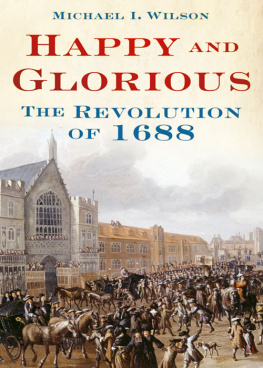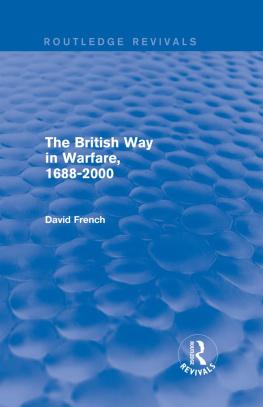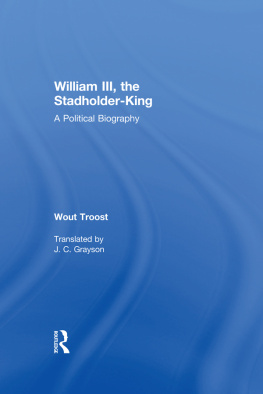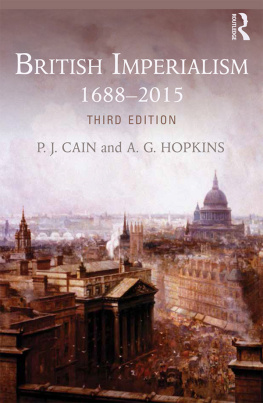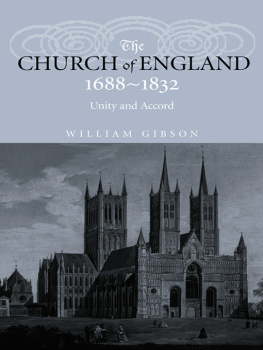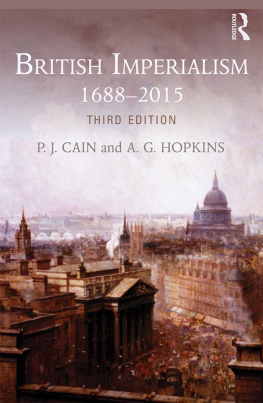BRITAIN'S COLONIAL WARS 1688-1783
Modern Wars in Perspective
General Editors: H.M. Scott and B.W. Collins
This ambitions new series offers wide-ranging studies of specific wars, and distinct phases of warfare, from the close of the Middle Ages to the present day. It aims to advance the current integration of millitary history into the academic mainstream. To that end, the books are not merely traditional campaign narratives, but examine the causes, course and consequences of major conflicts, in their full international political, social and ideological contexts.
ALREADY PUBLISHED
Mecixo and the Spanish Conquest
Ross Hassig
The Anglo Dutch Wars of the Seventeenth Century
J.R. Jones
The Wars of Louis XIV
John A. Lynn
The Wars of Frederick the Great
Dennis Showalter
The Wars of the Austrian Succession, 1740-1748
M.S. Anderson
The Wars of Napoleon
Charles J. Esduile
The Spanish American War Conflict in the Caribbean and the Pacific 1895 - 1902
Joseph Smith
China at War, 1901 - 1949
Edward L. Drever
The Wars of French Decolonization
Anthony Clayton
A Noble Cause? America and the Vietnam War
Gerard J. DeGroot
The Northern Wars
Robert I. Frest
Britains Colonial Wars 16881783
Bruce P. Lenman
First published 2001 by Pearson Education Limited
Published 2014 by Routledge
2 Park Square, Milton Park, Abingdon, Oxon OX14 4RN
711 Third Avenue, New York, NY 10017, USA
Routledge is an imprint of the Taylor & Francis Group, an informa business
Copyright 2001, Taylor & Francis.
The right of Bruce Lenman to be identified as author of this Work has been asserted by him in accordance with the Copyright, Designs and Patents Act 1988.
All rights reserved. No part of this book may be reprinted or reproduced or utilised in any form or by any electronic, mechanical, or other means, now known or hereafter invented, including photocopying and recording, or in any information storage or retrieval system, without permission in writing from the publishers.
Notices
Knowledge and best practice in this field are constantly changing. As new research and experience broaden our understanding, changes in research methods, professional practices, or medical treatment may become necessary.
Practitioners and researchers must always rely on their own experience and knowledge in evaluating and using any information, methods, compounds, or experiments described herein. In using such information or methods they should be mindful of their own safety and the safety of others, including parties for whom they have a professional responsibility.
To the fullest extent of the law, neither the Publisher nor the authors, contributors, or editors, assume any liability for any injury and/or damage to persons or property as a matter of products liability, negligence or otherwise, or from any use or operation of any methods, products, instructions, or ideas contained in the material herein.
ISBN 13: 978-0-582-42401-2 (pbk)
British Library Cataloguing-in-Publication Data
A catalogue record for this book is available from the British Library
Library of Congress Cataloging-in-Publication Data
A catalog record for this book is available from the Library of Congress
Typeset by 35 in 11/13pt Baskerville MT
This book, like the larger project of which it is the second part, has taken many more years to complete than I had originally envisaged. Over a dozen years have passed since the original contract was signed and there had been a great deal of thinking, reading and researching invested in what are now key parts of it in the previous decade. I am therefore more than usually indebted to others for the fact that it has reached publication, albeit in a much-changed format. First and foremost I owe thanks to Pearson Education for their patient and constructive encouragement in recent years; for their willingness to re-contract; and for their admirably professional editorial procedures from which I have derived much benefit.
I cannot say, as did one eminent English historian recently, that every word of his major work was written abroad. I stand heavily indebted to bodies such as the National Library of Scotland and the British Library. Within the latter my obligation to what used to be the India Office Library and Records and is now the Oriental and India Office Collections is such that I simply cannot express it in words. From my first worthwhile experience in historical research there in the early 1960s to the ongoing encouragement and companionship of its scholarly guardians now, I have derived immense benefit. When purely local library resources ceased to be of any utility, as they did as early as 1996, it was bodies like these, and their American cousins which enabled me to continue this project. Amongst the latter I must record assistance with relevant material going back to 1982. Among my major benefactors have been the Newberry Library of Chicago; the John Carter Brown Library of Providence, Rhode Island; the Folger Library in Washington DC; the Virginia Historical Society; and the Huntington Library of San Marino, CA. To list individuals would be invidious and interminable, but the courtesy, and respect for scholars and scholarship which characterises all the libraries I have mentioned, alone makes the historian's always self-isolating, and often sullen craft tolerable.
In the Department of Modern History in St Andrews I have learned much from the students who have endured my honours classes in North American colonial warfare; and on His Late Sacred Majesty King James VI & I and his kingdoms, as well as my special subject on the East India Company and India. They have made me defend my positions, and indeed beat one or two hasty retreats, to all our benefit. The department has underlined for me the mutual dependence of teaching and research, while the School of History has been both understanding and generous in supporting my research. From colleagues at the College of William and Mary and from a colleague in Emory University I learned much that compensated for my ignorance in areas important to this book. Of all my colleagues, it is not invidious to single out my long-suffering series editor Professor Hamish Scott for support above and beyond the call of duty, including bibliographical knowledge of matters imperial truly impressive even from a scholar in the apostolic succession of Edinburgh diplomatic historians deriving from Sir Richard Lodge.
Though I was able to incorporate the most important relevant works appearing in 1999, I regret that Fred Anderson's distinguished Crucible of War (Alfred Knopf, New York, 2000), came out after my own book was in galley proof. I am relieved to find that though our approaches and frames of reference could not be more different, I am in complete agreement with its main conclusions. The wonderful narrative style which makes it the twenty-first century replacement for Francis Parkman's classic nineteenth-century narratives is quite beyond my range. I end by dedicating this volume not to an individual but to a national tradition to which I am a very minor adherent. The Scots historians of empire trace their ancestry to the Scottish Enlightenment and to the man who was much its greatest all-round figure the Very Reverend Principal William Robertson, Moderate divine and historian of Scotland, America and India. In recent decades scholars like my old teacher Archie Thornton, and my own contemporaries like Gordon Stewart and John Mackenzie, have maintained that tradition. Their gritty integrity and scholarly bite has not always endeared their work to others swayed by contemporary fashions in thought. May this work add rather than detract from a tradition of which my own small nation, indeed any nation, should be proud.


